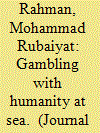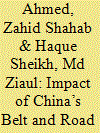| Srl | Item |
| 1 |
ID:
183878


|
|
|
|
|
| Summary/Abstract |
It cannot be overstated that in recent times the gravity and complexity of irregular maritime migration have triggered concerns and debates in the academic domains of International Relations and International Law. The article examines how states' compliance with, and enforcement of,international law and legal norms would tackle the challenges of irregular migration in the Indian Ocean region. The legislative and policy challenges regarding irregular migration can be analyzed under two segments. First, there is a lack of comprehensive discussion about the sending and the receiving states' commitments (regarding irregular migrants) to international law and legal norms. Secondly, deficit of comparative analysis to show how the littoral states comply with international law norms on migration and refugee influx. Such analysis from multiple perspectives would be helpful to get insights and make policy recommendations about how effectively international law norms could be enforced through national legislation and policy framework.
|
|
|
|
|
|
|
|
|
|
|
|
|
|
|
|
| 2 |
ID:
183876


|
|
|
|
|
| Summary/Abstract |
By focusing on domestic and geopolitical factors, this study aims to understand the impacts of China’s Belt and Road Initiative (BRI) on regional stability in South Asia. It critically examines China’s investments in Bangladesh, the Maldives, Nepal, Pakistan and Sri Lanka to understand how that impacts local economies and politics as well as the geopolitical climate considering the rivalry between China and India. As China seeks to promote alternatives for its partners to decrease their dependence on India and India-dominated institutions, there appears to be a negative impact of the geostrategic competition between China and India on South Asian regionalism. China’s economic influence varies and the evidence from Sri Lanka and Pakistan suggests that Beijing fully controls the deep seaports that it has built through BRI. While Beijing has engaged with a variety of political actors in the selected countries, it has not tried to influence domestic politics.
|
|
|
|
|
|
|
|
|
|
|
|
|
|
|
|
| 3 |
ID:
183877


|
|
|
|
|
| Summary/Abstract |
In order to reduce global temperature rise to 1.5-2oC against the pre-industrial values as agreed in the Paris Agreement, the world community has begun focusing on renewable energy. This effort requires nearly double the quantity of minerals as required for a 4oC rise and has forced humanity to look at exploiting deep seabed minerals. While extracting minerals from the Area Beyond the National Jurisdiction requires rules and permission of the International Seabed Authority, those in the national jurisdiction require permission of the concerned state. With focus on ‘sustainability’ as defined by the UN Sustainable Development Goals and on Security and Growth for all in the Region, the Indian Prime Minister announced the Indo-Pacific Oceans Initiative in 2019 with ‘Marine Resource’ exploitation as one of the pillars of mutual cooperation and growth. Accordingly, this article explores the possible practical cooperation for sustainable deep seabed mineral exploitation in the Indo-Pacific under the IPOI.
|
|
|
|
|
|
|
|
|
|
|
|
|
|
|
|
| 4 |
ID:
183879


|
|
|
|
|
| Summary/Abstract |
The ‘Indo-Pacific’ framework constructed upon the emerging shift in geopolitics from the Atlantic-Pacific to the Pacific-Indian Ocean region has underlined the increasing significance of maritime space as a theatre for geopolitical competition. Japan and India, which were historically on opposite spectrums, have now evolved into regional partners to increase their strategic influence and pursue in earnest the Indo-Pacific approach towards shaping the regional and maritime dynamics. This paper delves into the fundamental transformations in Japan-India relations; beginning specifically with imperial Japan’s fostering of bonds with the revolutionary nationalist campaigns in colonial India during the Second World War. The paper goes on to analyze the pre, post-War and post-Cold War evolution of ties between Japan and India, along with the transformation in priorities of both countries, converging on the diverse contours of maritime security cooperation in alignment with the shifting undercurrents of the 21st century geopolitics.
|
|
|
|
|
|
|
|
|
|
|
|
|
|
|
|